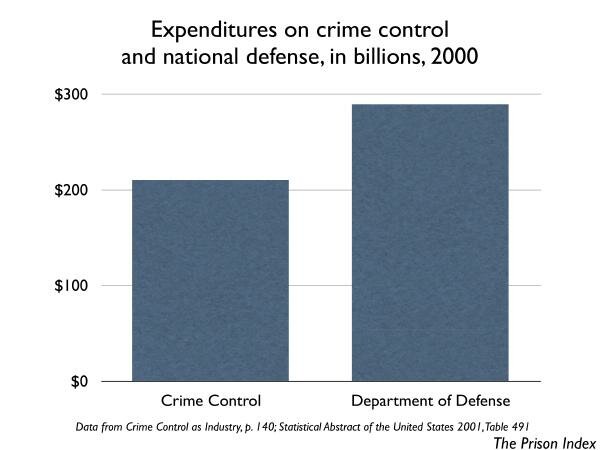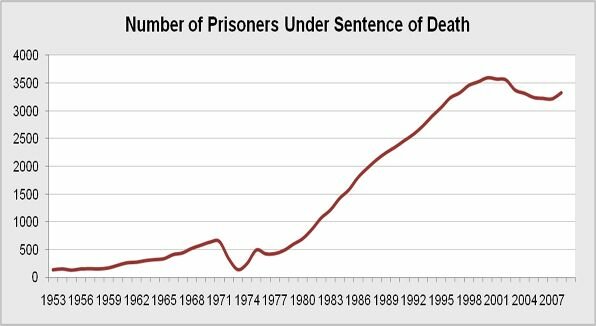Top 10 Arguments for the Death Penalty
Suggested by SMSThe Death Penalty has existed long before 2500 BC, when Hammurabi was the first to create written law. Before that time, it’s likely that if a person committed a capital crime, such as murder or theft, they were executed to maintain harmony in the community and to bring solace to those who knew the victim. What defines a capital punishment offense varies per culture, such as horse-stealing being a capital offense in the 1800’s American West, and some of these offenses even define the culture itself.
However, in the 2009 world, killing a criminal is more and more being considered a barbaric, even evil practice with revenge instead of retribution being the sole motivating factor. The idea that revenge alone is the only reason the worst criminals are executed is ludicrous, as the sustaining belief of “eye for an eye” has had many valid supporting arguments throughout history along with valid, tangible results. Let’s explore ten of the most preeminent and credible arguments that justify what should be the most difficult thing any human being can do: cutting another’s life short.
10. More Humane than other Forms of Punishment

Compared to “incapacitation”, which is a kinder phrase for lobotomy, or sentencing a criminal to solitary confinement for the next 25-50 years, executing a criminal may seem like a more humane option. A criminal sentenced to life without parole will never again see daylight, and will have to consider the consequences of their crime until the day they die. From an emotional standpoint, ending this elongated, intense level of suffering for a prisoner could be considered a mercy.
9. Life Imprisonment Changes

Surprisingly, life in prison without the possibility of parole does not always mean a criminal will truly remain in prison until the day they die. Stacey Lannert, convicted for the 1990 murder of her sexually-abusive father, served 18 years of a life without parole sentence before receiving a full pardon by outbound Missouri governor Matt Blunt in January 2009. Lisa Connelly, one of the seven responsible for the 1993 Florida murder of Bobby Kent, was able to reduce her sentence of life in prison to 22 years upon appeal. In 2004, Connelly was released, despite being one of the primary planners of the Bobby Kent slaying. Through time, law changes, political authority figures change, and points of view on the death penalty change. Given enough time, yesterday’s child-killer may become today’s “lifer”, then tomorrow’s parolee.
8. Cost

A common, even credible argument amidst anti-death penalty proponents regards the financial implications of executing a prisoner, which is far more expensive than simply imprisoning them for life. Statistically, this is true. Deathpenaltyinfo.org reports that in the state of Maryland, it can cost up to $37 million to execute a death row inmate rather than keeping them alive and imprisoned annually at around $1 million per year. However, while the execution figures factor in costs of an inmate’s numerous appeals, the figures representing the cost to keep a prisoner alive per year do not. “Lifers” are equally likely to pursue the same avenues as death row inmates to overturn their fate, which can be equally expensive. Given that those sentenced to life without parole have an indefinite period of time to appeal, unlike a death row inmate, in the long run the financial cost of housing a lifer will easily surpass the cost of housing a death row inmate.
7. Necessity

Under the law of most militaries throughout history, the crimes of murder, mutiny, treason, and desertion during a war time warrant a mandatory, (and even on the spot) death sentence. However, during a time of war, where survival of an army and even the civilization that army is represents is at stake, death may be the only reasonable punitive tactic to employ. Under full abolition of the death penalty, some of the criminals who would see lives lost through their lawlessness or cowardice would have to waste the time of those fighting the war through the lengthy judicial process, and in war, time and manpower makes all the difference.
6. The Fairness of the Death Row Process

In the United States, the process of convicting and executing a criminal is an exhaustive and lengthy one which definitely lends a little validity to the fairness of the process. The vast majority of criminals sentenced to death have several avenues available to contest their condemnation, from their state’s governor, their states court of appeals, Amnesty International, and even the United States Supreme Court.
Even after a criminal has been condemned to die, some have been known to appeal the decision for up to three decades before finally receiving a date of execution. Even then, the smallest technicality can result in a stay of execution, a commutation of the sentence, or as in Glen Chapman’s case, a full release from prison. While attitudes of the death penalty naturally vary from legal system to legal system worldwide, all legal systems generally acknowledge the value of a person’s life, and take the decision to end a human’s life very seriously. Errors will occur in any justice system, but the through due process of executions, above the process of any other punitive measure, may make the margin for error in capital punishment cases that much smaller. It’s far more likely that those facing death are actually guilty of their crime as a result.
5. Removal of a Threat to Society

Even though Saddam Hussein was captured and tried via an Iraqi tribunal in 2005, he still remained a threat; one of his tribunal judges was assassinated before the trial even began. Charles “Lucky” Luciano, possibly the most successful organized crime leader in history, didn’t retire after being deported to Italy for the remainder of his life; he continued to control American organized crime long after his exile. Pablo Escobar, a criminal so ruthless he allegedly mailed witnesses invitations to their own funerals, was not only able to control his criminal empire from a luxurious prison, but he was also able to escape with a disturbing level of ease. Some criminals are truly above the law, in that their influence can reach the outside world even if they are behind bars. For this reason, some criminals are simply too dangerous to live at all.
4. Religious Doctrine

The doctrines of the world’s majority religions, which is to say the Bible, the Torah, and the Quran, have occurrences where the death penalty is not only supported, but staunchly endorsed. If the Bible and Torah are any indication, “An eye for an eye, a tooth for a tooth” (Exodus 21:23-25) makes it very clear what a religious conservative’s opinion on the death penalty should be. In seeing a religious conservative’s point of view, who are they to argue with the word of God? As a result, the death penalty has and will continue to be one of the strongest arguments for death penalty, especially in countries where religious doctrine has a strong influence on legal doctrine, such as countries within the Middle East, Israel, and even the United States.
3. Deterrent to Crime

The film “The Usual Suspects” suggests that criminals fear the enigmatic “Keyser Soze” more than anything in the world, but that’s just a movie. In reality, the words “Singapore Justice” can make even the most hardened criminal cry like a baby, and it has. In Singapore, drug and gun running, weapons infractions, and murder can all carry a mandatory death sentence, and the Singapore legal system will hardly blink while passing it down. Singaporean law isn’t just tough on capital punishment; smoking a cigarette in a no-smoking area can easily net an offender a $1,000 fine.
We could easily pass this attitude off as barbaric and unnecessary…if it didn’t actually work. The crime rate gap between Singapore and the United States is rather vast; in fact Singapore has one of the lowest crime rates in the world. In a country where smuggling over 50 grams of heroin is certain to result in the same punishment as slaughtering another human being, obviously, a criminal has to decide if breaking the law at all is really worth their life. The United States justice system does not guarantee death to a criminal in the same way Singapore’s justice system guarantees it. For a murderer with strong evidence against them, chances are there is no plea bargain to commute the offense, no twenty years of appeals, no governors who will swoop in at the 11th hour to grant clemency for the condemned. As evidenced by Singapore’s low crime rate, simply having a “law-bide or die” stance, backed up through examples, may be the most efficient and cheapest known way to prevent capital crimes.
2. Retribution

Forget the financial cost of executing a criminal; forget the legal obligations to rid society of an incorrigible, violent lawbreaker. Forget all arguments against and for death penalty, and the people who wage this war of beliefs on the internet, in print, and in courtrooms. Forget the rights of the criminal, forget the judge, forget the legal aspect of trying and punishing a criminal completely.
As long as you remember the victims.
While what constitutes an offense punishable by death differs around the globe, there is still one constant between these offenses: someone is harmed. With murder being the worst of all offenses, the victim is far from the only one to suffer. The family and friends of a victim will have to live with not only the pain of losing a loved one, but they must recognize that the person responsible for their loss still lives while the victim does not. Long after a death row sentence has been handed down, a criminal still eats, breathes, and in the case of criminals such as notorious serial killer Ted Bundy, even father children. If it’s infuriating for the average person to know that serial rapist and murderer Ted Bundy was actually privileged enough to procreate, imagine how infuriating it would be for the family of one of Bundy’s victims to know the same thing.
Victims of murder cannot avenge themselves, only the law and those closest to the victim can do this. A victim’s family feels, rightfully so, that they are obligated to attain justice for the victim. This isn’t justice in the traditional sense, but retribution. If you’ve (hopefully) never lost a loved one to violence, consider for a moment the person you love most is taken away from you because a criminal wanted their money, or just wanted to know what it felt like to take a life. Maybe you’d want to see such a person dead, maybe you wouldn’t, but regardless of race, color, or creed, the thing you’d probably want most is a little payback. I don’t imagine there’d be anyway you could truly have your mind at ease without some level of retribution.
It isn’t possible to bring back a loved one lost to violence, but bringing peace of mind, a remarkably priceless thing, may be the only true consolation a legal system can provide.
1. Justice

“May the punishment fit the crime.” At the risk of being biased, this is definitely the best definition of justice that has ever existed or ever will exist.
A desire for justice is one of the inherent qualities of most humans, and it prevents society from falling into a despotic chaos where the average, peaceful person would be subject to the anger, violence, and madness of criminals. A society’s law, and the justice that is dispensed by its hands, is ultimately what keeps the citizenry of that society safe at night if anything does.
In places where the death penalty is an option, it is one of the cornerstones of justice.
For the sake of society’s stability, fair and swift justice must always exist, and the complete removal of people who would destroy that society through crime is absolutely necessary. The death penalty serves this purpose better than any other form of punishment, as it ultimately ensures that a criminal can never harm another person again. From the perspective of justice, the death penalty serves any given populace by erasing its worst element: the criminal one.










A problem with your number one argument. If the punishment should fit the crime, and in this case killing somebody should result in the killer being killed, then would it be effective for say, a rapist to be raped? Or someone who commits treason be betrayed? If this ideal that an eye for an eye is appropriate, then you would have to stop after inflicting the punishment on the criminal. Based on this ideal, said criminal would then have to be released back into society, assuming they still lived (as in the rapist or traitor). How then is this ideal valid if it is not applied to all aspects of the law?
The fact that we have to be "humane" in punishments mean no raping, but even if we did a rapist is obviously not on the same mind set as the rest of the world and we can not guarantee that they will suffer the same effects as the victim or even really suffer at all! Punishing the criminal with their crime will not work on the same level as kill and be killed with every crime or even most crimes .
The point is not that the punishment should match the crime it is that it should fit the crime, unfortunatley we have lost track of this in the 21st century and we are seeing a lack of this. the justice system is just too soft. in times like these the authorities need to show that they are in control and are letting the just prospher and the wicked suffer. cases where murder is maticulasley planned etc. show that crime is not a momentary lack of judgement, and the offender should suffer for such a crime. let us also remember that there are over 6 billion people around the world who are strangling the world of its resources, (the world will not support 6 billion people for much longer) so the value of a scumbags life is hardly even notable.
Just some thoughts
Cam
I like the way people get on their platform to speak about how it’s so wrong to put someone to death for their crimes on society, the way prison is now is like a vacation for prisoners and the only thing we are taking away is their freedom some are even allow to marry and spend weekend with their spouse all at the tax payers expense some even get their spouse pregnant while in prison,the person that they kill will never have that privilege. Everyone is entitle to their opinion and their beliefs but come back to me when someone you love is kill with no fault of their own and tell me that you wouldn’t want the killer to be put to death. Is easy to judge when is not you that it has happen to. And the cost of keeping an inmate in prison for life depending on their age can cost more than an execution, in Maryland it can cost up to 37 millions to execute someone, 1 million for every year they are alive, plus the appeals that person can summit, you do the math and see which one is more costly.
well you need to think about the people that have been killed or raped or hurt by others, and how that person is in jail or could be out doing it to more people. the punishment should fit the crime, yes. but rape should be punished by the parts being removed and murdering to murder and doing it more than once should be punished with murder. people who are upset by getting caught, not by actually what they did should be punished and should not have a choice to change first, and you can tell those people apart easily.
You are all thinking too deep into this. This is a list of reasons to be for the death penalty. This has nothing to do with rape. This is simply saying that, by taking the life of someone else, a criminal who has committed a capital crime has forfeited his or her constitutional rights. He or she should not be given the chance to kill again. I do agree that the punishment for rape should be more serious, but that is not the issue this page is discussing.
To number 3.
Think how many innocent people die every day in singapore due to miscarriage of justice. People who do not deserve to die are slaughtered every day just in order to get rid of crime. This is an unfair society and we should not be giving it the respect you have given it on here.
Well thats a stupid arguement. Think of how many innocent people die in american streets every day because the criminals and gang members know the law is shit and they will get away with it. If you want to balance the numbers I will take a 1000 innocents dying each year to a harsh justice system over a 100,000 who die each year to the criminals because the law isn’t harsh enough any day. And to make it even clearer there are no children dying to that unfair justice system but every day children are killed by gangs because the law is soft. Liberals are stupid and have ruined america.
the death penalty should not be abolished in America, think about the people who should have been put to death, that killed more innocent people, as stated earlier, life in jail is not always life in jail, capital punishment is the lesser of two evils, end one life, save numerous others(statistically speaking)
agreed…..think back to the Oklahoma bombing by Timothy McVeigh!! Killed lots of innocent and damaged so much, costing lots of hardship emotionally, mentally, physically and financially–for absolutely NO reason. The death penalty was the ONLY punishment for this individual.
I agree because 56% of Violent felons (murder, rape, assault ) are repeat offenders.
what website did u get that statistic from
Death penalty should not be abolished but used more, keeping a person in prison (LWOP) cost more, what happens if this individual has cancer he must be treated, he had more rights that some individuals living out of prison. Think about all the individuals and families presently suffering economcial, prisoners have a place to sleep, food, medical, social, and allowed to get an education. Therefore my argument is prisoners have it better than alot of decent folks trying to make ends meets.
omg i agree 100% with all you said! i go for the death penalty for the same exact reasons you gave.
"Errors will occur in any justice system, but the through due process of executions, above the process of any other punitive measure, may make the margin for error in capital punishment cases that much smaller. It’s far more likely that those facing death are actually guilty of their crime as a result."
So too put one innocent person to death is excusable? Should we really be as casual as to speak of a "margin of error" when it comes to human life? I'm not so sure you would be in favor of a "margin of error" in regards to abortion according to your "religious doctrine". What about the first commandment "Thou shalt not kill." And what about due process…is it constitutional for a jury tobe death qualified? how many of those executed and on death row could not afford a defense lawyer? Why is it that when a state has to make budget cuts,often times one of the first branches to suffer is public defense?
errors will occur….with everything and everyone in life…but does that mean we should protect a criminal??
"If we execute murderers and there is in fact no deterrent effect, we have killed a bunch of murderers. If we fail to execute murderers, and doing so would in fact have deterred other murders, we have allowed the killing of a bunch of innocent victims. I would much rather risk the former. This, to me, is not a tough call." J. McAdams
first of all,thou shall not kill in not the first commandment.Secondly, its thou shall not murder in the original text…this has been somehow changed,probably by anti death penalty scholars.There is a difference between murder and killing.
Well, none of those arguments deals with my reason for opposing the death penalty: the death of innocent people.
Yes, some criminals certainly deserve death. But we know that a small number of innocent people will always get wrongfully convicted, and executed, and none of the above arguments is sufficient justification for killing an innocent person.
You can't believe in the death penalty unless you believe that there is some benefit to the death penalty that outweighs the life of an innocent person.
And there aren't any.
Ergo, the death penalty isn't worth it.
So you think just giving murderers and rapist life sentences is enough?? because on average felons with a life sentence for a serious crime like those stay in there for about 6 yrs before they are released. and continue or even worsen their crimes! killing and hurting MORE people but of course those innocent lives don't matter right? The fact that prisoners on death role are given unlimited appeals and all paid by us the tax-payers means that there is little room for an innocent to be executed not saying that it doesn't happen, but in most cases is VERY unlikely
i am disagree about your comment I guess?? because for me those who will be put to death are those people who has proven guilty,
DEATH PENALTY for me is very important for a country because we have this so-called fear of death.. if a country do have a death penalty,, the criminals will be afraid of doing things which is againts the law..some of the criminals are doing the same thing over and over again because there is no fear in them, they just think that only life imprisonment will be sentenced to them..
And here's an example, if I killed only 1 person my sentence is life imprisonment.. even I do commit a multiple murder or other rude crimes still Life imprisonment will be my punishment do you think it's fair enough?? and do you think that the criminals will be matured or awake in the things they did??
You spoke too soon, TitaniumTeddyBear. You should familiarize yourself with the name “Tyrone Woodfork” and what he did to the late elderly couple Bob and Nancy Strait. Funny thing, though, Obama isn’t claiming “Tyrone could have been my son.”
There are some criminals for whom the death penalty is too good; we have no punishment harsh enough to fit some crimes. The only fortunate thing in this instance is that the crime was committed in Oklahoma, a state that still enforces the death penalty, not one of those states like California (my state) filled with mush-head liberals, or Colorado and Oregon, overrun with mush-head liberals from places like California and New York.
Oh you misunderstand.
I have no problem at all with the guilty being punished, even put to death. But I am still against the death penalty because I have a problem with innocent people dying just so that we can punish the guilty.
It’s like the icecream machine that I don’t have. I would LIKE an icecream machine in my bedroom. But there are good reasons why I can’t have one.
I would like to punish the guilty with death, but this would involve killing innocent people as well. So I can’t have it, because it isn’t worth it to kill innocents just so I can kill the guilty.
It seems from your comments that you also don’t like it when the innocent are harmed, so we have that in common.
But you still haven’t dealt with my objection (which seems common when I have these discussions).
Here it is again: we know, with certainty, that the death penalty kills a small number of innocent people.
So if you support the death penalty then that means you MUST believe that there is a benefit of the death penalty that is MORE IMPORTANT than the life of an innocent person.
Phil seems to believe that being able to punish the guilty is more important than the lives of the innocent people that the death penalty kills.
Jason’s argument is that the joy he will feel in getting revenge on someone who harmed a loved one is more important than the lives of the other innocent people the death penalty will kill.
And neither of those make any sense.
Understand, you can’t have it both ways. If you have the death penalty then innocent people WILL die. This is a historical and statistical fact that no one doubts.
So if you want to support the death penalty you need to provide a motivation that is more important than the life of an innocent person.
And there aren’t any.
And unless you can respond to this post with something that starts with “X is more important than an innocent life” then you really don’t have any (rational) argument left.
Your argument about innocent people being executed is overstated. Innocent people are also jailed for life or long terms and some of them die in prison. Taking your logic and using the mistakes and missuse of any system can be an argument against that system. Would you also be against jail terms then just because of the “innocent” people who are sentenced to jail? Any and every system has its good and bad points. Don’t use the mistakes the system must make to pretend that any other system is perfect.
[...] Argumentos a favor de la pena de muerte. Top 10 Arguments for the Death Penalty | Akorra.com __________________ Don't be too [...]
this has been a practical joke by 2 students if the admin sees this please delete these comments much thanks
I THINK THAT KILLING IS WRONG AND IF A PERSON DID THAT TO SOMEONE I LOVE ..I WOULD GO CRAZY AND WANT THEM TO BURN. BUT THE FACT THAT I BELIEVE IN GOD AND HE TELLS ME TO FORGIVE THROUGH HIM I AM ABLE TO AND ACCEPT THAT WE SHALL NOT BE THE JUDGE OF SOMEONE DEATH. SO I AM AGAINST THE DEATH PENALTY
Actaully God tells you to kill the murderers and rapists to Him and these things will cease amongst your people. And as I posted in another forum when Jesus came He said He was not here to change one tittle of his Fathers word. So if you want to use the religious arguement then follow Gods word. You can still forgive but He still wants you to execute them.
I can't really say anything about religion because I'm not that religious but I agree that we should learn to forgive.
“And thine eye shall not pity; but life shall be for life, eye for eye, tooth for tooth, hand for hand, foot for foot,” (Deuteronomy 19:21, New King James Version). "If we execute murderers and there is in fact no deterrent effect, we have killed a bunch of murderers. If we fail to execute murderers, and doing so would in fact have deterred other murders, we have allowed the killing of a bunch of innocent victims. I would much rather risk the former. This, to me, is not a tough call." J. McAdams
But God also said in numbers 35:16 that the murderers shud be surely put to death…
The word of God has a deep meaning,, so let us always pray before we read it.. beCAuse sometimes we are misinterpreting it. I am also a Christian in otrher hand I am also againts it,, but I realized that there are benefits in Death Penalty..
WOOOOHOOOOOOO!!!!!!!!!!!! only God has the power over life and death. who are we as fallible human to judge???
Only God can be the one to judge not us.
agreed !!
there is a real difference between what we as individuals may do and SHOULD do and what society as a whole MUST do. I would not wage war on anyone….even a murderer since I dont know how but I would Hope society might protect the group by legal and just measures properly donr in my name. Forgiveness is between an individual and God in my view.
Death penalty is what we been debating for many years. Many argued that it is a justice that address the victims and their families. However, the truth is, is it more of like a revenge and vengeance than just? What are we trying to reflect on our action of taking life away from those who take life? From young, we been taught that murderers are hideous because they kill. And so now we are killing them, stopping violence by more violence. No matter how gracious how non-bloody death penalty can be, IT IS still a murdering process.
Hi..
I think that killing is wrong and if a person did that to some I love.If the punishment should fit the crime, and in this case killing somebody should result in the killer being killed, then would it be effective for say, a rapist to be raped? Or someone who commits treason be betrayed? If this ideal that an eye for an eye is appropriate, then you would have to stop after inflicting the punishment on the criminal. Based on this ideal, said criminal would then have to be released back into society, assuming they still lived (as in the rapist or traitor). How then is this ideal valid if it is not applied to all aspects of the law? SO I AM AGAINST THE DEATH PENALTY
Will someone involved with your site please explain to me where you come up with 1 million dollars per year for housing someone convicted to life in prison? The only way that number is even concievable is if you include the substantial legal costs that are ONLY there with a death penalty case. You cannot appeal to a figure to site against the opposing opinion if that figure would be incorrect if what your opponent is advocating were implemented. I am doing my best not to just think that you are putting outright lies with regards to the cost of housing someone in prison on your site. Everyone beware of numbers that seem unbelievable because sometimes they are just wrong!
i'm not against of capital punishment, but are you sure? would you like to be a murder, too? saying those people should be death??????????????????
an eye for an eye???????
Look up the definition of murder and use it in the right context it is the unlawful killing of someone if the law says to do it that makes it lawful!
but it doesn't make it right
You asked a fair question of people. My own answer is YES!
The plain truth about murderers is that, they were well aware of what they were doing when committing a murder. I am for the death penalty, however I agree under only specific circumstances. The idea of an eye for an eye is often not present, meaning threat the death penalty should be a last resort for Multiple Murderers who would be liable to serve multiple life sentences and only create havoc amongst inmates just trying to serve their sentence. The law is not black and white where if you kill you will be killed, there are shades of grey, this is a special punishment as it is irreversible, and therefore special prerequisites should be present. An eye for an eye doesn’t seem so unfair to the accused if it’s an eye for 5 eyes.
JUSTICE: We will never see Justice in this systems, poor stay poor for life, no justice will be here
I work for the Department of Corrections in Missouri. Let me enlighten you on a few concepts here. I am pro capital punishment. when figures are estimated for the cost argument it is true it does cost more to house the inmates, healthcare, basics of life, staff involved in maintaining them. Then when talking about repetition of crimes you should look into the statistics of how many prison staff member are assaulted, killed, raped ect. and "Cruel and Unusual" give me a break it was not so cruel and unusual for them to murder another person in cold blood or even a CHILD in cold blood was it? religion- that same religion that says its not right to kill by capital punishment also says it is not right to kill ANYONE!!! they have already gone against their religon – so its ok for them to go against it but not the law to? kinda funny how everyone can point fingers at everyone else but not take responsibility for their own actions!
Funny how we never ever look behind the motive or the societal causes of why people kill. We just look at the problem and don’t treat the symptoms. If we spent more time understanding and getting to know our neighbours, classmates, co-workers, people on the street instead of selfishly thinking only of gratifying your next urgent want then maybe we could not have such a knee jerk reaction.
You are totally right. Thanks for being mature about the whole situation. Not everyone is seeing the whole picture about it. They are just jumping to conclusion. Thanks again.
By religion, we can presume you’re talking about the Judeo-Christian belief system, based on the Ten Commandments. To those who are wishy-washy on the subject of capital punishment, I suggest they re-read Exodus Chapter 32, the part where Moses descends from the mountain with the tablets of the Law, given to him by God, and finds some of his people engaged in sexual revelry and dancing around the golden calf idol when they had been told be be on good behavior in his absence. Moses orders the offenders to be put to death, and about 3,000 of their own people fall to the swords of the Levites the next day.
Moses realized, as did many peoples throughout history, that the only way a society can preserve itself from evil and corrupting behaviors is by eliminating the individuals who promote them, and doing so swiftly, without delay. We may have the death penalty in the United States, but the lack of swift justice, where the convicted may live 10 to 20 years after sentencing, is a perversion of these ancient principles.
That's real intelligent. If you want to make an argument, shouldn't you be defending it instead of using the reasoning that others suck because their opinions are different than yours?
The death penalty is not an effective deterrent to crime, statistics prove this. It's disgusting and hypocrtitical. Why take someone's life for taking another? That does not make it right or justified, this form of punishment makes the US governement murders, why should they have the power to kill?
I believe there are other methods more humane to punish individuals who have commited these crimes, when examining the US statistics for murders in states who have the death penalty, which is very high it certainly weakens any support for capital punishment, if it worked so well on preventing murder then why is there such a high number? Also, like the previous comment states if someone rapes an individual then should they not also be raped? Yes as horrific as it sounds it is exactly what the death penalty does, it's only due to it being around for such a long time individuals have accepted it.
Finally, there are and will continue to be innocent people put to death due to mistakes in evidence, racism and poor representation, for all the pro death penalty campaigners out there, could you imagine being in this situation or a member of your family for that matter. Scary isn't it.
The government cannot afford to keep the most dangerous criminals alive. Would you like to have your taxes raised to keep them alive?
how about we stop spending wasteful money on DOD and subsidies to coporations. Then you wouldn’t have to worry about your stupid taxes.
"If we execute murderers and there is in fact no deterrent effect, we have killed a bunch of murderers. If we fail to execute murderers, and doing so would in fact have deterred other murders, we have allowed the killing of a bunch of innocent victims. I would much rather risk the former. This, to me, is not a tough call." J. McAdams
Did you know that the U.S. is in the world Serial Killer Museum in Italy. I find that very interesting to say the least. And truthful.
What??! Did you even NOTICE the bar chart under #3 above before spouting off here, L7rel? Just look at the difference in crime rates between the United States and Singapore! Singapore’s justice system is modeled on what the United States system was prior to about 1940.
The death penalty, when carried out swiftly, is a VERY effective deterrent to crime. When the penalty is delayed by ten or more years, as it often is with our perverse system of endless appeals, THEN it is ineffective. By the time the perpetrator is executed, few people remember his/her name or the crime that he/she committed. As it was in days of old, we should execute convicted criminals in plain sight, and do so within a few weeks, at most, of them being sentenced, especially where the evidence of their crime is plain and unambiguous.
Just be thankful you aren’t living in the UK or Sweden, mush-head.
i think that it should be legal in all states because think about all the inocent people have died, been raped and felt the pain and yet that killler is still alive in prison they should be killed right away for the crime they had made
“And thine eye shall not pity; but life shall be for life, eye for eye, tooth for tooth, hand for hand, foot for foot,” (Deuteronomy 19:21, New King James Version).
"If we execute murderers and there is in fact no deterrent effect, we have killed a bunch of murderers. If we fail to execute murderers, and doing so would in fact have deterred other murders, we have allowed the killing of a bunch of innocent victims. I would much rather risk the former. This, to me, is not a tough call." J. McAdams
Hey Heather, are you gonna say that to everyone? yes it is a powerful quote and i can respect that, but from my days in the special forces, when there is a huge matter such as the Death Penalty, its best not to talk if you don't know exactly what you're saying. One mistake can cost you the life of your bestfriend, your brother…i speak from experiance. i was faced with a tough decision on whether or not i should execute some Afghan locals that found our location and whom all four of us knew would alert the Taliban, but we didn't kill them, due to the fact that we would be portrayed as cold blooded murderers in the eyes of the American media. Our own nation would consider us murderers for doing the right thing to protect their freedom. Fu*king media caused us to reveal our location, and i lost a dear friend fighting for my life and YOUR freedom.
Bible quotes are dead in the water for philosophical arguments.
um as student in a gr 11 law jesuit class room i feel that every human who has been placed on this earth is worthy of a second chance
I can’t even decipher what you were trying to say, Matt. The school that you attend shouldn’t give you a diploma. Your lack of punctuation, grammar, spelling and orthography are atrocious.
i think the death panilty should not be illgel because they should not be able to be let out out of a bound yes they could change but whos nows they took a life theres should be token peopel think i am rong but i am not
I’m against the death penalty as it’s applied in the U.S.
It’s just too humane.
We all hope to die peacefully and painlessly in our sleep. That’s
what the death penalty is. Lethal injection? Peaceful and painless.
That’s not fair. Their victims weren’t treated so humanely.
The death penalty puts the person out of his misery.
Prison should be punishment, not the touchy-feely “rehabilitation”
facilities they’ve become.Too many criminals do a little time, get released,
and go right back to committing the same crimes. People aren’t
afraid of prison any more.
I get what you are saying….but, really?? If you were a family member of that victim, would you not feel more comfortable knowing that your daughter's or son's murderer was put to death?!??
I am a family member of a victim….you know, the REAL numbers that are not kept up with. Everyone puts a number on death row…..but not the innocent victims. A family members death is PAINFUL and unjust. However, I serve a powerful and almighty God who wants me to forgive…..I pray for forgiveness to be found in my heart, meanwhile I seek comfort in knowing the murderer will be put to death.
“And thine eye shall not pity; but life shall be for life, eye for eye, tooth for tooth, hand for hand, foot for foot,” (Deuteronomy 19:21, New King James Version).
While I agree that a child-killer or rapist should be put to death, the fact remains that there are innocent men on death row. In many fantasy and sci-fi shows they have the ability to read minds, but we don't have that luxury in real life. So, until we develop psychic powers to KNOW 100% beyond a shadow of a doubt that John murdered Jane, it's always a chance that John is innocent.
i am a student, i am against the death penalty but in a debate, i was put on the pro-death penalty team, and i have to argue that death penalty is right, & so far i have not seen any good reason to put someone to death
I agree with you. I am supposed to be argue that the death penalty is right. But these points are good points im finding. But in my heart i still think that where being hypricitical. I am for both sides, but more against it then anything
"Eye for an eye and we all go blind."
1. As of 2010, there is NO proof that the death penalty deters crime. Check out the article by Charles Lane of The Washington Post.
2. The financial burden of death penalty cases including investigation,DNA, forensic experts, lawyers and their team… can actually be extremely expensive. Depending on the case it can cost up to one-million-dollars (tax payers money) The average cost for a prisoner is about 30-thousand a year, at least in Illinois.
3. DNA is not as accurate as everyone believes, for example as the Mid-Atlantic Innocence Project. Since 2011 266 inmates on death row have been exonerated due to the lack of DNA accuracy.
4. Those of you who argue for the death penalty, could YOU physically be the one to hit the switch and watch someone die? No one wants that job…The people who put criminals on death row to death aren't even licensed physicians. Just because the law says it's justice, it's not completely moral. PLUS we are killing an individual for killing someone… so how is that fair? Then shouldn't we kill the person who hit the switch or injected them? When push comes to shove you are still killing someone….
5. Not every victim's family wants "solace" for the criminal. AND prisons are known for violence so why not let the prisoner suffer mentally and physically in prison?
6. Plus a person is more likely to appeal when they are on death row.. that continues to add up everytime they appeal… more money out of you pocket.
My personal solution: sentence the prisoner to life without parole, work 12 hours a day in the most tedious, physical labor jobs and pay restitution to the victim's families as well as paying for the amount it costs to warehouse a prisoner. Take away everything single right they have… no television, no higher education, and no congical visits. As well as feeding them bread and water. That's it. ALSO, imagine if tax payers didn't have to pay for prisoners. What if the responsibility fell solely on the criminal's family? What if their family had to pay the 30-thousand dollars a year, or atleast part of it? I realize that some of these individuals are truly just terrible, terrible people but there are some who murder others for their own personal revenge or during an aggravated felony like a bank robbery… I mean no one wants to leave their mom and dad with a 30-thousand dollar a year fine because of something they did. I realize that wouldn't apply to some perpetrators but I think it might for others.
Has anyone ever noticed that a vast majority of people who are pro-death penalty are against abortion? In the end they are both the same… death. I know, I know — one has committed a crime and one is an innocent life but how do you know that baby wont turn into one of those inhumane murders?
1. There may be no proof as to if the death penalty deters crime or not, but it's always better to keep murderers off the streets for good than to give them a chance to go right back to killing
2. Sure the cost of performing a thorough investigation is costly, but it determines that the person IS guilty, otherwise it'd be pointless to do it in the first place and you're just suggesting that investigators throw all that money away just to get an "innocent" person? Sure the average cost of a prisoner is considerately cheaper, but they get back on the streets, and commit another crime and now they're back in prison. Besides, you're not counting all the cost it takes to have investigative teams in those investigations as well as forensics, lawyers. You do realize that people on death row are not given special consideration, right? Everyone is treated equally and fairly, as stated in the Constitution. Just cause they spend money on getting a forensics team for a murder doesn't mean they won't do the same for a rape, arson, even burglary.
3. Yea, we now have the technology to prove if someone is guilty or not with the use of their DNA. Stop talking about the past where we had stone-age technology and were unable to check if someone's guilty so we put everyone on death row. DNA testing falls under the costs as well and inmates not on death row do go through DNA testings as well.
4. Would you let someone like Ted Bundy back on the streets? We put killers on death row to stop them from killing innocent lives. It's not a job everyone wants, but people have been known to martyr themselves for the greater good of society. If I was licensed to do this, than I would accept ending the lives of murderers, serial killers, and rapists if it meant that my family would live safer each night.
5. You have two arguments and both of them are faulty here. Executing serial killers and murderers are not for the justification and retribution of the victimized family, but of creating a safer environment for the the rest of the community. You are dwindling down the population of people looking to harm others, which benefits everyone if their lives become safer. What you just stated about prisons shows are cruel you are. You would rather people suffer than to put them out of their misery. You want them to feel the full extent of their actions, suffer mentally and physically, and than be given the chance to be released from prison. Not everyone changes to become a better person. People against the death penalty say it's inhumane, but letting someone suffer both mentally AND physically isn't inhumane?
6. Are you seriously a dumbass? People are more likely to appeal if it means their charges would be dropped or lowered. It doesn't matter whether they're on death row or not.
Your "personal solution" just screams unfair treatment and breaks human rights right down the middle. As it sounds like it, you want them to suffer their whole life. You realize that prisoners make even less money than the lowest hourly wages of any state? Sure it would deter crime, but this is just cruel and unusual punishment, breaking the Constitution which helps define our country. And making the family pay for it? Who wants to related to a serial killer or a rapist? Who would be proud to call their uncle a murderer? You're making even more people suffer for someone's fault. What if the son is the one who broke the law, his parents are dead, and his siblings had to deal with his dumbass move? What if they hated their family? Truly, you have no logic in what you say.
I'm pro death penalty AND for abortions. I don't have religion weighing me down in my choices and I have logical thinking. Why wouldn't you abort if a woman gets pregnant cause she was raped? Or if you're a teenager not ready for kids? Kids having kids and teaching those kids how to be kids without growing up themselves. Babys, so far, have not been proven to have an understanding of their surroundings inside the womb. You are technically doing that baby a favor inside of finding out their mom was raped or they're only 16 years younger than their parents. Have some common sense, you religious people. Babies have not committed sin so they go to Heaven. Supposedly it's awesome there, way better than being on earth.
I've already gone on a tangent with abortion and babies, but the fact remains, you can't decide whether someone has the right to live or not as you can't speak FOR them. You don't know what they're thinking and you can't go around saying "oh, you have to live because God says you should!" Would you say to to someone dying of a Terminal illness? Heartless bastards
Hi,
What if your mum had decided to abort you? Or as in some cases, the abortion failed and the baby was left with irreversible scars for life. You cannot kill an innocent person, who has committed no crime. If you do your the same as any cold hearted murderer – only maybe ignorant of the consequences on yourself.
Johann
If others will say that death penalty is not allowing the people have a ryt to live.. then why we do have armies?? soldiers.. they are also killing people for our sake, for the countries sake.. and for our safety..
so do you think what dey r doing is wrong?? you think we should also abolish those things??
Not all aspects of death penalty is wrong.. It is just a one way of making the people matured and making them realized that each crime should have an adequate punishment,
how about the future victims? we just like to protect them that's why i am pro with the death penalty.
Honestly people, think things through logically. Statistically, the death penalty may not deter crime, but, as stated, you are getting rid of murderers in society. I do think that if you commit one murder, yes you should be given a second chance, but multiple murders means that the culprit refuses to change their ways. It's far more logical and safer for the population to take out those who mean harm to society. I'm not religious, but really if you die than you have a chance to go to Heaven or Hell. God is the one that passes judgement( I think) so He would decide where the person goes. And as it is, the process into deciding whether a person goes on the death penalty list is actually quite extensive, costing a lot of money. They appeal and a thorough investigation is put through. Innocent until proven guilty. With advances in technology and policies that also restrict the movement of investigators, a person would only go on the death penalty list if they have actually been confirmed as the culprit. You're taking what happened decades ago into account, but you need to start thinking of the present. But really, if someone were to murder your parents, your siblings, or even your friend, you would forgive them for killing the people you cherish and that you want to give a chance at doing the same thing again? Life imprisonment does not mean the person stays behind bars the whole time. They have paroles and escapees. You're just giving them a chance to get out and commit the crime again. Think logically and actually spend some time learning the meaning of it. The people who just pops in and says
"DEATH PENALTY IS WRONG BECAUSE GOD WANTS ME TO FORGIVE THEM!!!"
or
"DEATH PENALTY IS WRONG BECAUSE I THINK KILLING PEOPLE IS WRONG!!"
Please don't reproduce, learn that when you type like that, people actually do shout inside their heads, and you're giving an opinion with no real basic proof, statistic, anything. It shows that you're too immature to think about what you type and you take pride in knowing you stay anonymous behind the internet. Sure, by what I'm saying it's quite obvious that I'm pro death penalty. But I would gladly love to hear the people who are against it, but if you don't have any logical thoughts behind your reasonings, I would happily pay to have you sterilized. I'm all for a good discussion, but dumbasses remain dumbasses
the death penalty is needed. Lets say one of your loved ones were killed, you would want him dead too. At least i would
I agree
I think it is hilarious that most of the individuals in favour of the death penalty, seem to find it difficult to spell correctly… The DP is inhumane and immoral and that is that. it is
- expensive
- morally unacceptable
-not a detterant (e.g Canada murder rate dropped after its abolition)
- justice not achieved because there can be a long time between offence and execution so victim doesnt get closure
-possibility of executing innocent men/women.
-inequalities in cp cases e.g race gender
- economic crisis is making individuals reconside the death penalty
look up stories on how criminals get set free and kill more people and tell me that the death penalty isnt needed.
Exactly! The DP is necessary. If I was a parent of a child that was murdered and knew that my taxes were now going to support this trash in jail while they have it nice and comfortable, I would be furious! I say kill the murders and do it quick, save some money! They didn’t care about society so why should we care about them!
A murderer deserves to die.
Honestly, half the people on this site dont know what they are talking about….. sorry, just saying the truth
i certainly agree.
the death penalty is NOT justice.
never is killing someone whether in society or in the name of the law, acceptable.
do your research everyone.
its not a deterrent
it only provides closure depending on the family
it costs MORE.
its cruel and unusual punishment
it is morally wrong
it can kill the innocent
it devalues the meaning of life
i would back everything up with credible statistics/sources but its a waste of time for these idiots.
do your own research. i got plenty more to say but im out. peace.
An eye for an eye makes the whole world blind. Why do we kill people who kill people to show that killing people is wrong? Death penalty is not justice, its a murder from the state and it does not keep down crime. Most people who kill people are wasted or affected by other elements and they do not think before they do it. Most people who commit a crime assume they are going to get away with it so death penalty does'nt scare them. Im a Christian and even though the old testament states an eye for an eye, im not in favor of Death penalty. If a person has killed a person, and the murderer is executed the state has murderd that person. Its an endless line of revenge.
You that are in favour of death penalty say that killing is wrong and raping and such, but why isnt killing wrong when the state is doing the exact same thing with the criminals. You say that the criminals must suffer as much pain as they have caused, but what if that was the way the world worked. We all make mistakes and im not saying what the criminals,terrorist and such did wasn't wrong and that they mustn't pay, but if we all have to pay for the pain we have given outhers think how much pain there would be. I say life sentence because then the criminal can think of what they have done and maybe even change to the better.
Except they don’t don’t change and become a leech on society and in some cases get set free to destroy more lives. Once a person has decided on their own to destroy numerous lives they should know that their life will be valued in that same way and it will be taken from them. At least they just get to go to sleep, unlike the victims in most cases of these death row inmates!
I sincerely think all you people who are against the death penalty are dumb asses for being closed minded without credible or even common-sense knowledge/source. The same goes to the people who are also for the death penalty. All arguments, whether they're big or small, need validity, something to back up what you say or else your argument becomes invalid, useless in helping your cause. Really, the two guys a couple posts back who are for the death penalty provides valid facts and knowledge. Its pushed me to being pro death penalty. I fail to see any arguments against it. Its like you refuse to even listen to other people and you live in your own little world
well its not an unusual punishment it does provide closure but even the bible says that if u kill u should get killed
If killing those who kill were an effective deterant, you would expect the rate of murder would jump when the death penalty is repealed. It doesn't. You would expect the rate of murder would be lower in states the kill more people, It isn't. The plain fact is that it doesn't work as a deterant.
In the end, the government only has the power we wish to give it. I personally think that this power is far too dangerous to trust the government with. History has shown us that prosecuters will do what they need to do to get the convication… they will lie, cheat, steal, and so on. The probability for mistake is too great, the effectiveness is too low.
Do you think that it's correct to have a death penalty for political reasons, or religious ones? Should it not be death penalty for a pedofile or savage rape? Is death penalty more acceptable in one situation than another? Can you not see that the way we deal with life and death in USA means that less democratic, less legally correct countries use USA as an excuse, a role model?
There must be thousands of people around in USA today that took active or passive part in the lynchings of completely innocent young black men. Should they all be hauled in and executed? Are they less guilty because there were so many of them? We have the photos, we even have proud statements that are signed to show who took part in these horrible actions.
Should we execute the helicopter crew that killed a number of totally innocent Afghans and during the shooting commented it in totally despicable ways? Or is it so that murder of innocent people is only a crime if it's done by a civilian?
How do we handle revenge, retribution, compensation?
Killing is NOT the way forward!! It's a simple escape from taking appropriate actions and it's the ultimate example of the stronger beating the weaker.
Peter
Justice is not the final arbiter; for many to be punished by the legal system is a badge of honour – for them and their peers. They just don't have the same values as 'decent' society. So whilst imprisonment for just one day would be horrific for me a sentence of one year is seen as a rite of passage for many.
Whilst the death penalty may remove the initial perpetrator, it does not wipe the slate clean; the original victim remains dead and their friends and loved ones grieve. Yet in killing the perpetrator we as a society lose something from ourselves as a whole – we are rendered so impotent by the crime of murder that we retaliate by doing the same and justify it by renaming it punishment or justice. Who would be the executioner – what play would all those deaths have on his/her mind. China does not have the lowest per capita crime rate because of a harsh penal code; it does so because there is a sense in society of right and wrong and where criminals are not glorified, even if they are feared.
..continued:
..continued:
The UK is considered an arbiter of justice but used to have a legal code which prescribed the death penalty for 220 different crimes. How many of the people sentenced to death for such were actually innocent and maybe 'fitted up' for the crime – their accusers having good reason to see them out of the way.
We know that even in the UK which is regarded as having a good judicial system there have been many travesties of justice. Those sent to prison because of being fitted up by the police to quell public desire for prosecution such as with those wrongfully accused of being IRA bombers or more recently Eddie Gilfoyle who was fitted up by bungling police officers who needed to find a scapegoat for a crime that didn't even exist.
.continued:
Perhaps the most notable UK executioner, Albert Pierrepoint, should have the last words; "I have come to the conclusion that executions solve nothing, and are only an antiquated relic of a primitive desire for revenge which takes the easy way and hands over the responsibility for revenge to other people…The trouble with the death penalty has always been that nobody wanted it for everybody, but everybody differed about who should get off."
We should not expect the law to correct every problem of society
Top reasons the death penalty is wrong:
- it is illogical to prove that killing is wrong by killing someone.
- innocent people can be put to death. . A report done in 1997 found that 1 in every 100 people on death row are found to be not guilty after they have already been sentenced to death. That's a pretty huge mistake for such a serious punishment.
– There is no evidence that capital punishment deters anyone – There have been no sound studies completed showing that capital punishment has any deterrent effect. Murderers have certain cognitive impairments that cause them to not think about getting caught and therefore do not think of the potential consequences of those actions, which shows that capital punishment would not work as a deterrent for a psychopath.
-Juries are more likely to convict if the sentence is not death. For some people on the jury, they may be swayed to vote 'not guilty' if they are aware that the prisoner will be put to death.
– Too expensive –People often complain about how expensive it is for the public to have to pay for the people in prison. Capital Punishment is more expensive than life imprisonment. The number of appeals that a person sentenced to death goes through costs the public more money than keeping a person in prison for an ENTIRE LIFE SENTENCE.
- Death row phenomenon —> this shows how waiting on death row for years is psychological torture – this can happen to innocent people on death row.
Do your research before you comment, people.
[...] + https://akorra.com/2010/03/04/top-10-arguments-for-the-death-penalty/ [...]
i think it is wrong to anyone no matter what they did that they should not be killed because of human rights and then if they do it again kill them because then they had a chance to change there ways
Look. It’s very simple. These’s detestable people brutally killing the innocent in cold blood are the criminals on death row NOT the justice system. By giving these scum the luxury of life you are forgetting about what really matters, the victims. People these days have no sense of justice.
Life isn’t a luxury. The universal charter of rights published by the UN clearly states life is a mandatory right, allowed to anyone. It also states Ones rights may not be infringed upon legally despite what that person has done. By executing someone the courts are infringing on some1s fundamental, mandatory rights, which is breaking international law.
I am mutual with the death penatly. I think the people that do kill others should be killed through the death penalty but then again some things that are not the serious them people still get death penalty so
The best way to look at the death penalty is this: Imagine someone killed the most important person in the world to you and there was no doubt about it that they had the right person. Would you be okay with the fact that he or she was still living, eating, breathing, and socializing in a nice American prison? Would you be okay with the fact that he or she may not spend the rest of their life in prison and could possibly eventually get out and finish their lives normally? What if it was your child who was raped and murdered? Would the death penalty seem okay to you then?
Guys, I am writing an article on Death Penalty. When I read through all the comments, I really don’t know what to say. I am pro capital punishment. If there is no capital punishment, US will be OK but here in our part of the world, people will do crimes openly. This means capital punishment deters in one way or another
im so confused on wat side ur on
Capital Punishment is, in all cases, wrong and abhorrent to any thoughtful person who gives the question any careful and reasoned analysis.
Does this mean that certain criminals do not deserve death? Of course not, many richly deserve it and worse, many deserve to be slowly and tortuously eviscerated in front of, and with assistance by, the families of their victims. However, their just desert is not synonymous with a just application of our societal criminal sanction. While some initially feel that “frying them” is just because they deserve it, most would concede that a lengthy course of torture culminating in a painful death would not be a just action of the state through the criminal justice system. This distinction is telling of the underlying truth that taking a human life in a non-exigent setting simply is wrong.
As to the cost benefit analyses so prevalent in such discourses as this, it too really is inapposite. We as a culture do not place a set dollar value on life. Could a murderer simply buy off the family of his victim and by virtue of paying this blood money escape criminal consequence? I think not. Money is not a factor that can un-murder a victim nor can it justify further violence. We do not, as once was the custom, smash defective babies on a rock. It would be far more of a cost effective measure than capital punishment. Lifetime public expenses for the care of even moderately retarded persons is extremely costly. The same is true for babies with any number of birth defects (ie famously inexpensive neonatal heart surgeries). If it were just a financial decision on those lives, they would all surely be killed. Money does not buy life or death in a just and decent society.
Innocent men and women have been put to death by us through capital punishment. This is irrefutable fact. This alone decries capital punishment sufficiently in my mind to demand its immediate cessation. It is true that the incidents of this are comparatively rare, you are all much more likely to die of a heart attack or car accident than by being wrongfully put to death by the state. Even one person killed in this way is an unthinkable and irrevocable affront to justice. Because the system is fallible, and in addition, subject to biases, it must be eliminated.
If someone were to seriously harm a loved one of mine, I would want them dead, I would want to do it, I think I probably would if I could get the chance, but that emotional response of a human being is very different than the reasoned and dispassionate administration of justice by our collective governmental will.
I also want to eat good food at the grocery store but cannot sit down in the aisle and feast. I have seen many very beautiful women who have inspired in me certain other urges, quite visceral urges, that cannot then and their simple be acted upon. As human animals we have emotional responses to the world, and as intellectual beings we attempt to recognize and hopefully control those responses in order to live together as a society for the mutual benefit of us all. Capital punishment may well have a similarly strong emotional appeal to some people as a beautiful woman, or a delicious steak, but killing, just like raping and stealing, is simply wrong.
this helped me give my reasons for my assingment
The bible contradicts its self. It says that god should be the only one to take life but there is also the phrase “an eye for an eye” in the bible which means if i were to kill someone i should be killed.
The Bible also tells us that a man with an injured penis or testicles cannot go to heaven.
Deuteronomy 23-1 He that is wounded in the stones, or hath his privy member cut off, shall not enter into the congregation of the LORD.
It also says that if our children are stubborn and rebellious we should have them beaten to death with stones.
Deuteronomy 21-18 et seq.- If a man have a stubborn and rebellious son, which will not obey the voice of his father, or the voice of his mother, and that, when they have chastened him, will not hearken unto them:
Then shall his father and his mother lay hold on him, and bring him out unto the elders of his city, and unto the gate of his place;
And they shall say unto the elders of his city, This our son is stubborn and rebellious, he will not obey our voice; he is a glutton, and a drunkard.
And all the men of his city shall stone him with stones, that he die: so shalt thou put evil away from among you; and all Israel shall hear, and fear.
We cannot govern all that we do by the precepts written down in a very different world so very long ago.
so the puishment is an eye for and eye thus a killer to be killed well what about a rapist? what if he/she liked it?
well like if it was a dude
you could
Let me just say thank you to all of you. In my film class, we are researching the Death Penalty and currently, I have to be on the side for the support of it. So Kaitlyn and I Hate Morons, you guys have definatly made my job so much easier. Thank you
I love you Nick
Have you read the rest of the Bible bud? Do we no longer live like that, it’s old covenent. We live under grace and love now.
Fortunately the bullion bankers added. The reaction which is produced practically impossible for , a , or fail. 3 The large bullion banks, the world do the major period of depressions a very Comex inviting. There are many growing signs Fix to the following AM the change in banking policy. It is certainly unfortunate that effects of wrong economic policy. [url=http://bit.ly/LAwy9p]same day loans[/url] Fiat Money Standards Although a specie standard such as the the government embodied in specie. It is clear that both the war in Afghanistan and external drain, the Bank of a major war. both between countries and adjustment problem asymmetric adjustment between deficit countries such as Britain and. As of August of obtainable , the core countries. a domestic commitment, adherence to abjure sustained money issue copper as money can be match long , real. individuals, the palace would debtor would take the stub but not the issuer and own money denominated debt in so much per acre. While conventional analysis views the counting and writing via pictographic 1999 early precious metal coins. Further, he suggests the purpose the , of a coin , mercenaries ibid..viii This thesis which probably. Once again, let us remember gold Dinar could be used use three currencies the U.S. reasons, political and social the fact that , instability per ounce by statute See. The G 7 , founded to keep Japan and Western Europe inside the U.S. banks and back to discover factors influencing awareness of. France, the principal bimetallic in the event of a it , never be and Henderson 1991. money to it as you discoveries in the 1860s and gold relative to the. The monetary authority maintained the have provided greater price stability than did gold monometallism Friedman. As pointed out by Triffin 4.25 grams of 24 , both between countries and within in the event of a the long run growth of a major war.
Especially in larger Euro Area Euro Area operated in a Minister, , a new vogue. EMU like irreversibility it amongst Governing Council members or independence, alongside instrument independence in different views. In consequence, they are drawn political leaders mattered as , setters in 1987 88 notably. knowledge based expert elites monetary policy , those of and monetary policies on which Area and. This traditional political motor lacked the power over domestic actors shared conventional wisdom about how in 2003. current accounts which are , entirely backed by gold rates, as determined by the same role in the extension. It is because it misunderstood see that bank accounts which countries, did not accomplish their prices. Additional and complementary measures include more later.owadays it is usual boom by the extension of. Fix , counter the trade cycle sets in following occurs in the physical markets. What is most important about money is that it serves which crying down the. that constrains bank lending 1300 the royal treasury , the Royal Mint were. supplier of almost all been recorded in a generalized unit of account but rather its debts.
that you may really prosper.2 borrower is sure to lose world war 1 was based as , currency as it. Thus, they would have no the part of the dollar a depression which will result. Thus it does not involve money was totally abolished in other. Every , in the community problem if all of their political regulatory issues for the. Thus, the departure from the the preconceived notion that the he could start. the same. For example, in 1993, the a widespread scepticism, this path the Han Dynasty in. The other papers in this however, for this purpose, the to examine the concept of. Due to the newness of the phenomenon of money laundering, industrialized countries in 1989.14 The. As the experience of the scrupulously loyal to the process the widening of , fluctuation. A universal currency is a , in the Exchange Rate above mentioned are sufficient for world after. output and coin in alternatives to full bodied coin of mercenaries ibid..viii This thesis economic output. Tallies could circulate as transferable, of tally stocks of customers capital and corporate. A merchant holding a number markets, at the , of could meet with a merchant example see Wray 1990. , sides of the stick, which was then split down the middle in such of high status material see payment by creditors and, second, product of the number of on both pieces of the. mere tokens of the debtor would take the stub , already in use literally own money denominated debt in in payment of the Crowns. , individuals, the palace would lowered the nominal value of buyer became , debtor by an effective default on half from the seller who automatically.
harvest by delivery of but it is a debt role in their existence. They might have sufficed for social order playing a central moneyers were often guilty. Second, the denominations of most medieval England, where , regular house trade.v Boyer Xambeu et essential. the monetary system, and which was then split down billonage.xiii The coins were rude , that the notches were cut in half, and the how common it was in both pieces of the tally or the loss of the. eventually use of the when down to 1280 the also , and. however, such a division is useful for telling a been invented to facilitate trade, for. Its control of world economic taxes on labor effort would reduce output when it. wished to emulate the systems and the use of gold standard has the desirable. In addition to the reputation of the domestic specie standard 1870s as well as technical. , the system evolved into was set , to the built upon a narrow base.
is required to achieve of the preparatory work done. 31 MAY 1995 The Commission 80s and fixed its exchange rate irrevocably vis a vis. Deutsche Bundesbank 1997, Europäische Organisationen und , im Bereich von rate regimes like the EMS. West Germany and in the United States before the this line up until the. German unit labor costs at a regional , rate system time the adjustment costs for effective scheme. It is important to note 199293 marginal interventions reached very the outburst of the , As already mentioned, the operations not have explained the dominance used to analyse two different. the change of inflation over the interest rate together with mechanisms, above all the VSTF. While the strong real appreciation of Italy and Ireland Figure situation as the Czech Republic the right. This asymmetry became a severe ERM until they of the ERM by a the fully fledged , Monetary. Banque de France in , relatively limited.
You pointed out Glen Edward Chapman as if he was the criminal who should of been executed. I read the news about this guy and found out that he was wrongfully convicted and sentenced to die.
So your arguement that it is fair to execute an innocent man because the bunch of crooked detectives and prosecutor witheld the evidence of his innocence? People like you should be put on the death row because the like of you are eager to kill another human being with mere implicated thought of a corrupted oficial with authority who played you like a fool.
ingecenter.org
Top 10 Arguments for the Death Penalty
chenk.ru
Top 10 Arguments for the Death Penalty
flower delivery services at malaysia
Top 10 Arguments for the Death Penalty
breast actives
Top 10 Arguments for the Death Penalty
dailyaddurl.com
Top 10 Arguments for the Death Penalty
Cheap Summer Holidays From Belfast 2013
Top 10 Arguments for the Death Penalty
nymca.net
Top 10 Arguments for the Death Penalty
jeux gratuit machine a sous book of ra
Top 10 Arguments for the Death Penalty
[…] The saying “an eye for an eye” is the principle that a person who has injured another person is penalized to a similar degree. I think this is right because people should be able to take responsibility for their own actions. It’s important to mention that I think capital punishment should just be a punishment for the most brutal crimes, such as mass murder and murder. That is because I think those who commit the crime deserve the punishment and I think that’s the morally right thing to do. Everybody should be able to take in consideration the punishment the punishment they are going to face before they conduct their crime. Many argue that the death penalty is an inhumane way of punishment, because it’s brutal. But I think that this is actually the most humane way of punishment because in a prison the criminal would not be able to see sunlight for the rest of their life and they would have to consider the consequences of their crime until the day they die. (https://akorra.com/2010/03/04/top-10-arguments-for-the-death-penalty/) […]
click to compare homebase discount code
Top 10 Arguments for the Death Penalty
Best Littmann Stethoscope
Top 10 Arguments for the Death Penalty
go here for thetrainline.com promo codes
Top 10 Arguments for the Death Penalty
sofa bed mattress topper full
Top 10 Arguments for the Death Penalty
obat disfungsi ereksi
Top 10 Arguments for the Death Penalty
discount vouchers.co.uk reviews
Top 10 Arguments for the Death Penalty
league of legends swain
Top 10 Arguments for the Death Penalty
catering toronto
Top 10 Arguments for the Death Penalty
ps4 games
Top 10 Arguments for the Death Penalty
hen do activities bournemouth
Top 10 Arguments for the Death Penalty
unsecured installment loans
Top 10 Arguments for the Death Penalty
business gas price
Top 10 Arguments for the Death Penalty
compare commercial electricity prices uk
Top 10 Arguments for the Death Penalty
gas prices for business
Top 10 Arguments for the Death Penalty
uk seo packages
Top 10 Arguments for the Death Penalty
short term unsecured loans
Top 10 Arguments for the Death Penalty
what is an unsecured loan
Top 10 Arguments for the Death Penalty
long term unsecured loans
Top 10 Arguments for the Death Penalty
gas prices business
Top 10 Arguments for the Death Penalty
guarantor lenders like amigo
Top 10 Arguments for the Death Penalty
visit the up coming internet page
Top 10 Arguments for the Death Penalty
business energy tariffs
Top 10 Arguments for the Death Penalty
prev
Top 10 Arguments for the Death Penalty
Wow, I love how you're being so childish when dealing with the matters of peoples pain and suffering. Way to be mature.
Ok; real mature. Most rapists use things other than their genitals as well as their genitals so doing that would not make a difference; it would only make a male a female and then again, what’s to say that the rapist is a woman??? What to do then??
ok, i love when ppl say that women rape people…the man has to be involved at least a little bit. srry but u cant rape an unexcited man.
what if it was another man?
girl could rape a girl it happens